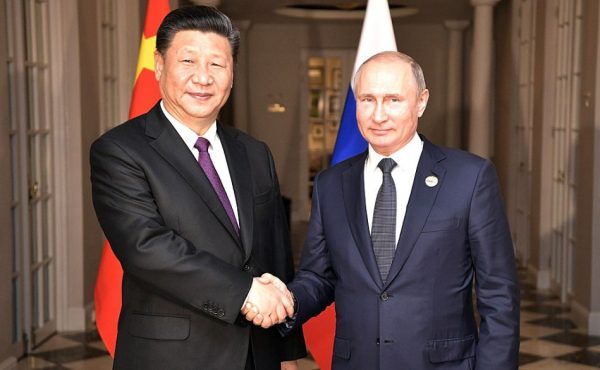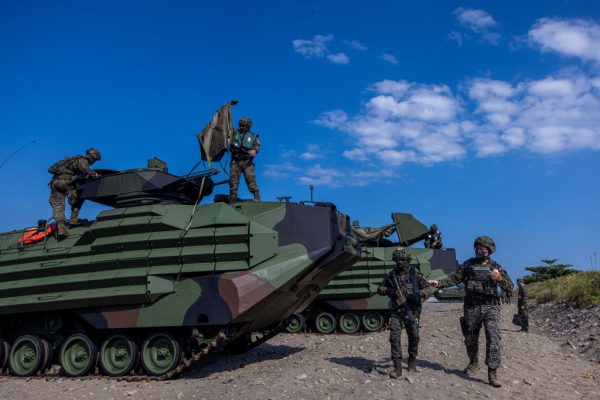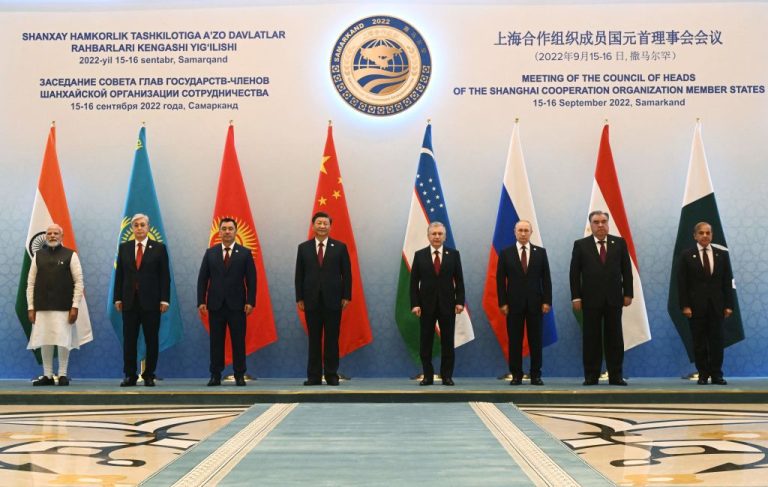Chinese leader Xi Jinping is visiting Kazakhstan and Uzbekistan — two of the most populous countries in Central Asia — where he met with Russian President Vladimir Putin and other leaders from India, Pakistan, Kyrgyzstan, Tajikistan, Kazakhstan and Uzbekistan on Sept. 14 and 15.
The purpose of the meeting, which has been named the Shanghai Cooperation Organization summit, is to “strengthen a security group formed by Beijing and Moscow as a counterweight to U.S. influence,” NPR News reported.
The visits mark Xi’s first diplomatic trip overseas since the COVID-19 pandemic began in the central Chinese city of Wuhan in early 2020.
MORE ON CHINESE POLITICS:
- Pelosi’s Taiwan Visit Sharpens Tensions at a Bad Time for Beijing
- Chinese Premier Li Keqiang to Step Down Amid Xi’s Struggle for a Third Term This Fall
- Xi’s Political Status Intact After Beidaihe, But Crises Deepen Ahead of Party Congress
- Why Xi Replaced Chen Quanguo, Infamous Party Head of China’s Xinjiang Region
- Taiwan Fires Shots at Mainland Chinese Drones, Warns of Counter-Attack if Territory Violated
Xi’s arrival in Kazakhstan on Sept. 14 comes one month ahead of the Chinese Communist Party’s (CCP) 20th Party Congress in Beijing. The meeting takes place every five years and is expected to see Xi secure a precedent-breaking third term as China’s president.
Putin: ‘We appreciate the well-balanced position of our Chinese friends’
During the meeting in Uzbekistan, Putin thanked Xi for his “balanced” approach to the Ukrainian crisis, and criticized the U.S. for its “ugly policies” and sweeping sanctions against Russian energy.

Success
You are now signed up for our newsletter
Success
Check your email to complete sign up
Putin also said he was ready to discuss unspecified “concerns” by Beijing in regards to Ukraine.
“We highly appreciate the well-balanced position of our Chinese friends in connection with the Ukrainian crisis,” Putin said while facing Xi across a long table.
“We understand your questions and your concerns in this regard, and we certainly will offer a detailed explanation of our stand on this issue during today’s meeting, even though we already talked about it earlier,” he added.
A statement issued by the Chinese Foreign Ministry after the meeting stated that though the two leaders “didn’t specifically mention Ukraine,” it made note of Xi’s promise that Beijing’s “strong support” for Russia’s “core interests,” remains unchanged.
On Taiwan and Ukraine
While the statement gave no further details on Ukraine, experts noted that Beijing’s use of “core interests” to describe issues pertaining to national sovereignty, and the ruling Communist Party’s claim over Taiwan, casts an ominous shadow over the CCP’s willingness to reclaim the self-ruling island by any means necessary — even if that means going to war.

Tensions have escalated between mainland China and Taiwan (officially known as the Republic of China but governed separately) after U.S. House Speaker Nancy Pelosi’s unscheduled visit to Taipei on Aug. 2. Pelosi’s trip marked the highest-ranking visit from a top U.S. official in 25 years, and underscored Washington’s obligations to provide military training and other necessary aid in helping Taiwan defend itself against a possible communist invasion, as laid out in the 1979 Taiwan Relations Act (TRA).
“We condemn the provocations of the U.S. and its satellites in the Taiwan Strait,” Putin was quoted as telling Xi.
Russian Foreign Minister Sergey Lavrov told reporters after the meeting that Moscow and Beijing are “on the same page” when it comes to assessments about Ukraine. Lavrov also described the talks between the two leaders as “excellent,” and said the meeting was held in a “very businesslike and concrete way, involving a discussion of tasks for various ministries and agencies.”
“We don’t have any differences,” and we fully agree on this issue,” he said, adding that both countries “will continue coordinating our actions, including at the upcoming United Nations General Assembly.”
Political significance
Some observers see the trip — after such a long period of remaining in China — as an indication that Xi is secure in his bid for a third term as Chinese president and head of the CCP; that is, he does not fear the possibility of a coup attempt or other trouble in his absence.
“Xi’s travels abroad at this time reflect his confidence in his domestic political position and a sign that he has already secured key political agenda items at the 20th Party Congress,” analysts at political risk consultancy SinoInsider wrote in a Sept. 15 newsletter.
The Xi leadership, the newsletter said, is “looking to strengthen relations with Central Asian countries, and particularly those that produce oil, to somewhat offset the pressures facing the PRC [People’s Republic of China] from the U.S.-led global order and its climate agenda.”
Moreover, Beijing is looking to put renewed emphasis on its Belt and Road infrastructure investments as a reaction to increasingly negative views of Communist China and its aggressive “wolf warrior” diplomacy, as well as “setbacks stemming from the Russia-Ukraine war.”
“Countries like Kazakhstan and Uzbekistan are hoping for China and Russia to throw them an economic lifeline and shore up their national security as the U.S. and its allies move away from fossil fuels,” SinoInsider, which specializes in forecasting elite politics in the PRC, wrote.
At the same time, Xi walks a fine line in his meeting with Putin, as “strengthening China-Russia camaraderie and bilateral ties could invite further and unwanted Western pressure upon Xi and the PRC ahead of the 20th Party Congress,” the analysis said.
Beijing hopes to strengthen position in Central Asia
During a meeting with Kazakh President Kassym-Jomart Kemeluly Tokayev on Sept. 14, Xi stressed his support for Kazakhstan’s territorial integrity, and why it was important to strengthen diplomatic relations between the two nations.
“No matter how the international situation changes, we will continue our strong support to Kazakhstan in protecting its independence, sovereignty and territorial integrity, as well as firm support to the reforms you are carrying out to ensure stability and development, and strongly oppose to the interference of any forces in the internal affairs of your country,” Xi said in a statement released by Kazakhstan’s government.
Known as a close ally of both Russia and China, the former Soviet republic reportedly has felt “more intimidated by potential threats to its territorial integrity” since Russia’s invasion of Ukraine began on Feb. 24.
The region is also part of China’s ambitious Belt and Road Initiative, which was built with the intent of globalizing Beijing and expanding trade via ports, railways and other infrastructure projects across multiple countries ranging from the South Pacific through Asia to the Middle East, Europe and Africa.
Experts pointed out that China’s economic inroads and investments in Central Asia have fueled unease in Russia — which sees the region as part of its sphere of influence.














